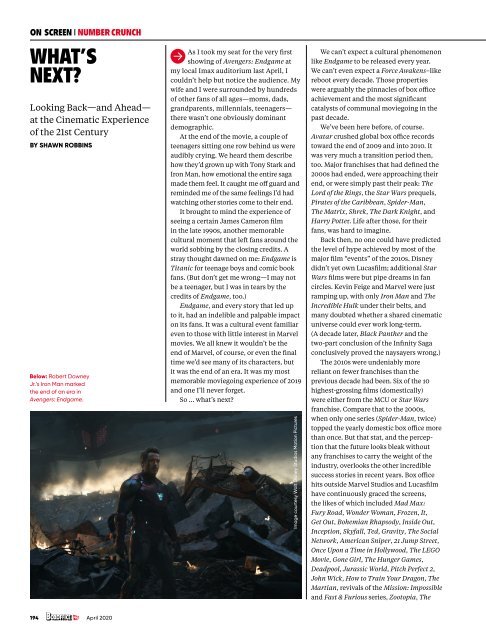Boxoffice Pro - April 2020
Boxoffice Pro is the official publication of the National Association of Theatre Owners.
Boxoffice Pro is the official publication of the National Association of Theatre Owners.
Create successful ePaper yourself
Turn your PDF publications into a flip-book with our unique Google optimized e-Paper software.
ON SCREEN NUMBER CRUNCH<br />
WHAT’S<br />
NEXT?<br />
Looking Back—and Ahead—<br />
at the Cinematic Experience<br />
of the 21st Century<br />
BY SHAWN ROBBINS<br />
Below: Robert Downey<br />
Jr.’s Iron Man marked<br />
the end of an era in<br />
Avengers: Endgame.<br />
As I took my seat for the very first<br />
showing of Avengers: Endgame at<br />
my local Imax auditorium last <strong>April</strong>, I<br />
couldn’t help but notice the audience. My<br />
wife and I were surrounded by hundreds<br />
of other fans of all ages—moms, dads,<br />
grandparents, millennials, teenagers—<br />
there wasn’t one obviously dominant<br />
demographic.<br />
At the end of the movie, a couple of<br />
teenagers sitting one row behind us were<br />
audibly crying. We heard them describe<br />
how they’d grown up with Tony Stark and<br />
Iron Man, how emotional the entire saga<br />
made them feel. It caught me off guard and<br />
reminded me of the same feelings I’d had<br />
watching other stories come to their end.<br />
It brought to mind the experience of<br />
seeing a certain James Cameron film<br />
in the late 1990s, another memorable<br />
cultural moment that left fans around the<br />
world sobbing by the closing credits. A<br />
stray thought dawned on me: Endgame is<br />
Titanic for teenage boys and comic book<br />
fans. (But don’t get me wrong—I may not<br />
be a teenager, but I was in tears by the<br />
credits of Endgame, too.)<br />
Endgame, and every story that led up<br />
to it, had an indelible and palpable impact<br />
on its fans. It was a cultural event familiar<br />
even to those with little interest in Marvel<br />
movies. We all knew it wouldn’t be the<br />
end of Marvel, of course, or even the final<br />
time we’d see many of its characters, but<br />
it was the end of an era. It was my most<br />
memorable moviegoing experience of 2019<br />
and one I’ll never forget.<br />
So … what’s next?<br />
Image courtesy Walt Disney Studios Motion Pictures<br />
We can’t expect a cultural phenomenon<br />
like Endgame to be released every year.<br />
We can’t even expect a Force Awakens–like<br />
reboot every decade. Those properties<br />
were arguably the pinnacles of box office<br />
achievement and the most significant<br />
catalysts of communal moviegoing in the<br />
past decade.<br />
We’ve been here before, of course.<br />
Avatar crushed global box office records<br />
toward the end of 2009 and into 2010. It<br />
was very much a transition period then,<br />
too. Major franchises that had defined the<br />
2000s had ended, were approaching their<br />
end, or were simply past their peak: The<br />
Lord of the Rings, the Star Wars prequels,<br />
Pirates of the Caribbean, Spider-Man,<br />
The Matrix, Shrek, The Dark Knight, and<br />
Harry Potter. Life after those, for their<br />
fans, was hard to imagine.<br />
Back then, no one could have predicted<br />
the level of hype achieved by most of the<br />
major film “events” of the 2010s. Disney<br />
didn’t yet own Lucasfilm; additional Star<br />
Wars films were but pipe dreams in fan<br />
circles. Kevin Feige and Marvel were just<br />
ramping up, with only Iron Man and The<br />
Incredible Hulk under their belts, and<br />
many doubted whether a shared cinematic<br />
universe could ever work long-term.<br />
(A decade later, Black Panther and the<br />
two-part conclusion of the Infinity Saga<br />
conclusively proved the naysayers wrong.)<br />
The 2010s were undeniably more<br />
reliant on fewer franchises than the<br />
previous decade had been. Six of the 10<br />
highest-grossing films (domestically)<br />
were either from the MCU or Star Wars<br />
franchise. Compare that to the 2000s,<br />
when only one series (Spider-Man, twice)<br />
topped the yearly domestic box office more<br />
than once. But that stat, and the perception<br />
that the future looks bleak without<br />
any franchises to carry the weight of the<br />
industry, overlooks the other incredible<br />
success stories in recent years. Box office<br />
hits outside Marvel Studios and Lucasfilm<br />
have continuously graced the screens,<br />
the likes of which included Mad Max:<br />
Fury Road, Wonder Woman, Frozen, It,<br />
Get Out, Bohemian Rhapsody, Inside Out,<br />
Inception, Skyfall, Ted, Gravity, The Social<br />
Network, American Sniper, 21 Jump Street,<br />
Once Upon a Time in Hollywood, The LEGO<br />
Movie, Gone Girl, The Hunger Games,<br />
Deadpool, Jurassic World, Pitch Perfect 2,<br />
John Wick, How to Train Your Dragon, The<br />
Martian, revivals of the Mission: Impossible<br />
and Fast & Furious series, Zootopia, The<br />
194 <strong>April</strong> <strong>2020</strong>

















